Pressure on working mums at a ‘tipping point’ but dads are stepping up… slowly
PRESSURE on working mums is at a “tipping point” with the overload of stress also flowing onto their children, as women lug the bulk of domestic duties despite now working comparable hours with their partners. SHARE YOUR STORY HERE.
News
Don't miss out on the headlines from News . Followed categories will be added to My News.
WOMEN are burning out as they lug the bulk of domestic duties despite working comparable hours with their partners, new research reveals.
Pressure on working mums is at “tipping point” with the overload stress also flowing onto their children.
Nearly four out of five mothers with children aged 5-9 work, but they also still do twice as much domestic work as their partner.
PART 1: MIDDLE AGED MUMS USING ALCOHOL TO COUNTER STRESS
RELATED: HOW MUMS BALANCE WORK AND HOME
SHARE YOUR STORY IN THE COMMENTS BELOW.
A yet-to-be published Monash University study of 800 working mothers has revealed the extent of “role-combination stress”.
The mothers were working nearly a full week outside the home, an average 31 hours, plus nearly 24 hours a week of household chores.
Their partners were doing only 10 hours of cooking, cleaning and washing outside of paid work.
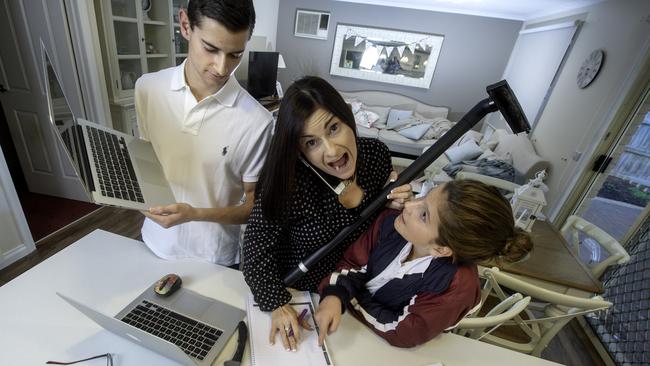
Researcher Melanie Patterson said mothers were returning to work for “survival” but still shouldering the responsibilities of home life.
“People are very fortunate now if they can survive on just one wage … partners are helping mothers to be able to work, by doing more childcare, but mothers are still doing twice as much at home.”
The findings are backed by Australian Institute of Family Studies research that even when fathers stay home, breadwinner mothers still do more work around the house.
Mothers do 23 hours before and after their paid work, compared with a total of 21 hours for stay home dads.
AIFS director Anne Hollonds said she was “genuinely shocked” by the results.
“Many more mums are going out to work, but what hasn’t changed is the division of responsibilities at home.” This is due to “the stickiness of cultural norms”.
“Some of these pressures are not new, but the necessity to work wasn’t there in the past in the same way. It is essential now for both parents to work.”
Ms Hollonds warned “something’s got to give” where families and couples reassess who does what at home.
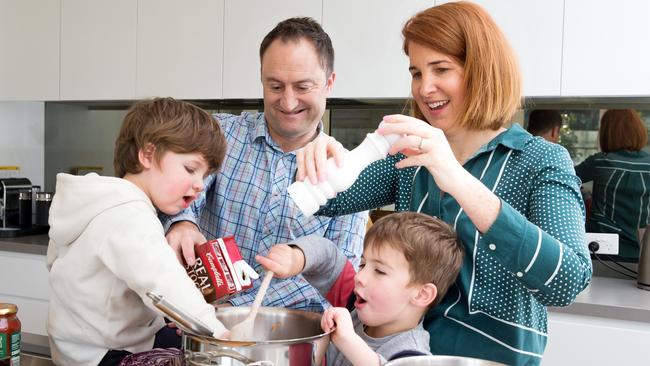
“I’m wondering whether we’ve reached a critical point; a tipping point,” she said.
The stress on time-starved working mums is also trickling down to children.
La Trobe University’s Professor Jan Nicholson said there was a clear link between mothers stressed by multiple roles, and children’s behavioural and mental health problems.
And she said 20 years of research had shown the demands on mothers domestic and care roles had not changed.
“Difficulty juggling the demands of work and home doesn’t go away as children get older, family-friendly policies are focused on the early years, but the data is showing … problems (managing the combined load) persist through childcare and primary years and we’re seeing it into high school years.
Her research for the Longitudinal Study of Australian Children is showing working mums sacrifice sleep and time for themselves.
“They give up is sleep and self-care time, they don’t give up time with their children, or housework,” said Professor Nicholson.
Dr Liana Leach, an ANU researcher examining family, work and mental health, said about a third of working mothers “report they’re having difficulty managing work and family demands”.
This applied to mothers “across the board”, no matter the child’s age.
SIGNS YOU MAY BE BURNING OUT
* Long term tiredness, lethargy, feelings of depression, sense of being overwhelmed, forgetfulness, increased weight, sleeping difficulties, unsatisfactory relationships.
* Difficulty prioritising issues, everything seems too much. Difficulty problem solving.
* Not ‘future oriented’, ie not optimistic about where they see themselves.
SOLUTIONS
* Time to call in support and delegate tasks.
* Recognise limitations of time
* Commit, through an active decision to engage in self care. You need to look after yourself.
— Source, psychologist Sandy Rae
wendy.tuohy@news.com.au or on Facebook
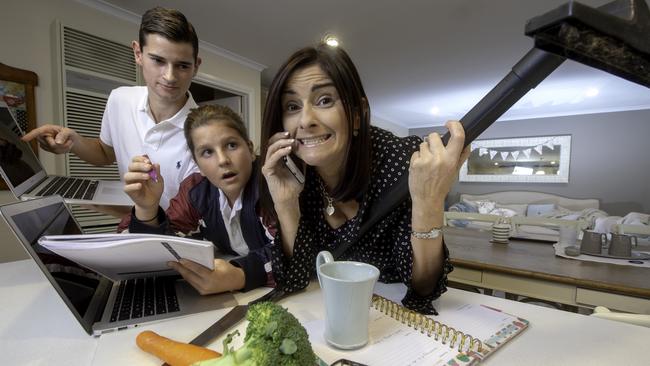
FALLING DOWN AND GETTING BACK UP
WHEN single mother of two Sharon Talbot-Witt posted on Facebook about having hit “breaking point” from overload, she was amazed at the outpouring from other women.
“I had been doing too much,” says the teacher, children’s author and speaker. “I posted something saying, ‘I’m not OK today, I’m exhausted, I’ve pushed myself too hard, said ‘yes’ to too many things, am really feeling overwhelmed by everything that is expected of me.
“I said, ‘I’m not OK, but I will be’. And I was stunned by the amount of women who wrote to me saying, ‘Thank you for posting that, I too am not OK today, I’m struggling’.”
Ms Talbot-Witt believes social media adds extra pressure to working mothers to make their “juggle” seem a breeze. She would like women to feel freer to seek support.
“I feel like I’m constantly juggling and chasing my tail, fortunately I have two kids who step up and help.”
She said anxiety can be a consequence of striving to work, run homes and be great parents all at the same time.
“I wake up with this absolute sense of overwhelm, your heart could be racing, just this feeling of dread, of ‘I just can’t do today, I’m committed to too much’.
She hopes speaking up about her own occasional need to “give myself permission to crash for a couple of days” when it all gets too much will encourage other working mums to go easier on themselves.
“We are all doing the best we can.”
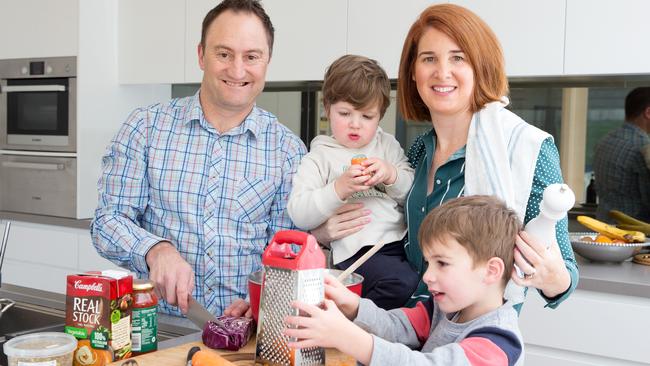
WORK LIFE BALANCE LEVEL: ACHIEVED
REBECCA Lacy and husband Damian have a “divide and conquer” approach to parenting and domestic chores.
The pair rely on structure, routine, planning and mutual hard work to keep their family of four in work-life balance.
Both work full time, share housework and care for sons Harry, 4, and Angus, 2, equally.
“It doesn’t always work, it’s just a case of being able to keep all the balls up in the air for as long as possible,” Ms Lacy said.
“There is lots of planning and people around us who we rely heavily on, we are very fortunate in that respect.”
All four grandparents are slotted into the family calendar to help with care for the boys, alongside organised childcare.
Both have employers who allow flexible work arrangements, so neither parent has the default responsibility to take time off when, for example, a child is ill.
“From week to week we have a plan in place that includes things like drop offs and pick-ups, who’s doing what on what night or what day, at home.
“We just need to plan as much as we possibly can.”
The parents share the household labour, a lot of which is done on weekends, and have paid cleaning help every fortnight.
“If he’s home before I am, he’ll do the cooking, one will do the dishes or the preparation required for our meal, it just depends who’s home and whatever needs doing,” Ms Lacy said.
“We divide and conquer.”
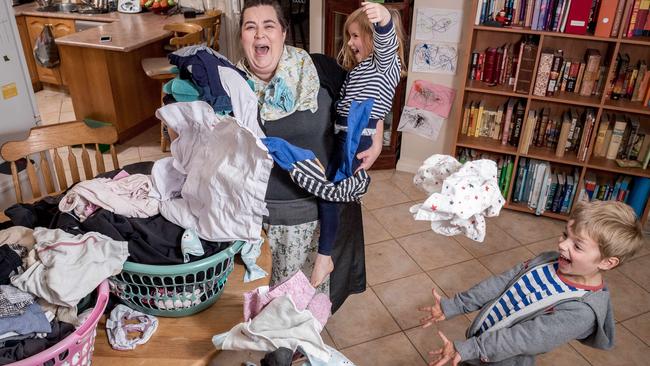
PARENTS COME TOGETHER TO SHARE THE LOAD
Alys Gagnon, executive director of the parenting lobby The Parenthood, which has 63,000 members, says mothers in the network talk about the toll of carrying the “mental load” as well as the majority of household work and logistics, plus paid work.
“Mothers are doing the majority of the actual (housework) but they’re also responsible for organising all the other things done in the household, which permission slip has to go back, what bit of uniform has been washed, dried, is there any garlic for cooking dinner, they have to hold all the information in ter head and even if they have a partner, they are required to give directions (which adds to a sense of overload).”
She says the fact mothers typically are the ones expected to play multiple roles within families and extended family, as well as do work outside the home, “is a source of stress because it means they have less time to relax, engage in things that matter to them, build who they are and give them a sense of place in the world outside of work.”
She says many switched on families in The Parenthood have worked out ways to collaborate and have good domestic arrangements, but “ some have terrible arrangements as well, they’re living with a 1950s stereotype, except that they have to do to (paid) work as well”.

HOW WOMEN SHOULD TAKE CARE OF THEMSELVES
LOUISE Newman, professor of psychiatry at Melbourne University and director of women’s mental health, at the Royal Women’s Hospital says it is important to understand the pressures on women due to expectations around pregnancy, parenting and achievement.
“We live in an achievement-oriented world, and parenting can be added to that list.
“Sometimes people feel very pressured by not just doing it but finding it easy doing it well. It sets up unrealistic expectations, and not only are they high, but many don’t have the benefit of extended family and supportive partners,” she says.
As exhaustion and disturbed sleep can increase the likelihood of depression, new mothers should get as much rest as possible especially if they are juggling work.
“Sometimes women have unrealistic expectations of getting back to work too early, we some staggering examples of women who have collapsed who are trying to do it all,” she said.
A sign that support may be needed is if the mother is not taking joy in the child or children.
“There are challenges, particularly with toddlers and preschoolers, but most parents can get through that and still have joy in their child … if someone’s got anxiety or depression they can withdraw from the child, they can’t play, they can’t enjoy the child. That could be time to get some parenting help.”
She suggests local council services as the place to start.
“Unrealistic pressure (on mothers) has to be named, we have to call it out.”
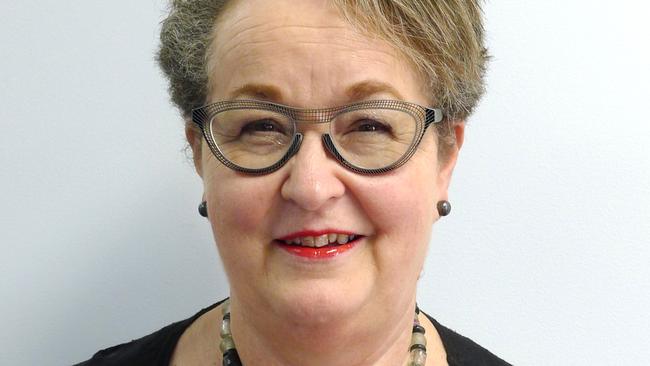
CALLS FOR HEALTH AND SAFETY GUIDELINES FOR MOTHERS
FATIGUE among mothers of young children was “a major public health problem” that should be treated like a workplace safety issue, a leading women’s advocate says.
Unpaid work in the home was often invisible with a lack of support for mums struggling to juggle the load.
Jane Fisher, professor of women’s health at Monash University and leader of its Jean Hailes research unit, said health and safety codes should be drafted to protect mothers and young children.
“Evidence about mothers of young children shows many have disabling levels of fatigue,” she said.
“Really quite severe fatigue measured in women admitted to early parenting services is more severe than if they had been impaired by alcohol.
“There is huge literature about occupational fatigue among shift workers, long distance motor vehicle drivers … and regulations about how many hours you can be on duty in a row without relief.
“Care givers of young children are way outside that. In my opinion we should have occupational health and safety considerations at home as in the workplace; quantify how much work a person is doing in 24 hours and what relief are they getting, and what can we provide to make sure she and her baby (and he) are safe.”
Ms Fisher said women struggling to carry paid and unpaid work was “a major public health problem we should be interested in”.
“Occupational fatigue associated with care giving becomes disabling; so disabling,” she said.
“But this is devalued because it’s not called ‘work’.”
“Trying to run a household with young children in it, and trying to maintain some kind of income generating work is almost an impossible thing to sustain.”
Ms Fisher said the enduring “presumption” that children benefit more from care by their mothers than fathers, and men do not know how to do it should be challenged.
“Children benefit enormously from experiencing care from both parents,” she said.
Sharing it more equally would provide mothers with more opportunity to share the mental health benefits of participating in work outside the home.


